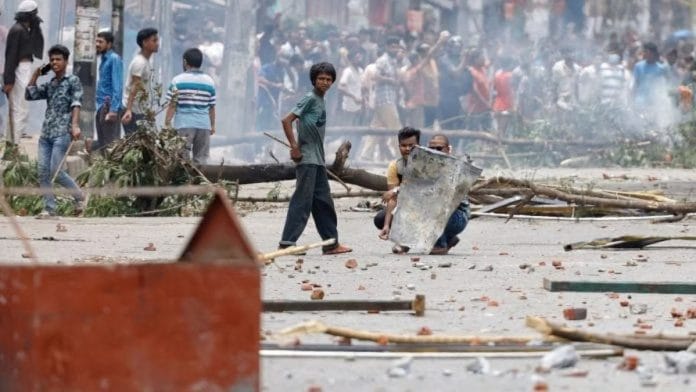New Delhi: The Dhaka University authorities have announced the provision of special admission facilities for family members of those killed or injured in last year’s student-led July uprising that had triggered the fall of the Sheikh Hasina-led government in Bangladesh.
According to local media reports, these privileges will be available during the admission process for the first-year undergraduate programme during the 2025-26 academic session, according to a university press release issued on 26 May.
The decision was taken at a recent deans’ committee meeting of the university, the press release said.
The university has decided that spouses, sons and daughters of gazetted individuals killed or injured during the “July revolution” will be eligible for the facilities. In case of no spouses or children, the benefits will be extended to the victims’ siblings.
Bangladeshi journalist and political commentator Sahidul Hasan Khokon told ThePrint that it is “ironic” how not even a year has passed since the protests that began with the demand for abolition of quotas for descendants of the heroes of the 1971 war of independence, which resulted in the fall of an elected government.
“Within a year, special facilities are being extended to the kith and kin of the July revolution. What are these special privileges, if not quotas by another name?” he said.
The quota protests had begun in Bangladesh in June 2024 in response to the Supreme Court of Bangladesh reinstating a 30 percent quota for descendants of freedom fighters, reversing the government’s decision in reaction to the 2018 Bangladesh quota reform movement.
In July last year, students from Dhaka University blocked major intersections and the police precinct in Shahbagh, a popular square in Dhaka. The student-led blockade at Shahbagh square continued for days, the Al Jazeera had reported. The protest against quotas had turned into a one-point demand for the dismissal of Hasina’s government, even as law enforcement officials and students clashed on the streets. Following Hasina’s eventual ouster in August, the Muhammad Yunus-led interim government took over.
A fact-finding report by the UN Office of the High Commissioner for Human Rights said that around 1,400 people were killed during the July 2024 uprising in Bangladesh, and many were injured. These included extrajudicial killings, excessive use of force that led to severe injuries, mass arbitrary arrests, and widespread torture, according to the report.
Khokon told ThePrint after such violence just a year ago over quotas in government jobs, where Dhaka University students played an active role, one would think that the country is done with quotas and special arrangements.
“But it seems if one type of quota gets abolished, another kind of special arrangement is announced soon enough. After all, the quotas against which students had protested last year were for the descendants of women and men, who fought for the independence of the country,” he said.
(Edited by Mannat Chugh)






